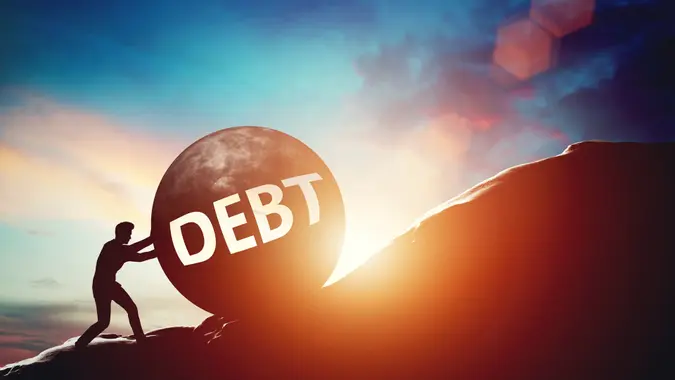6 Reasons Credit Card Debt Is Growing — and What To Do About It

Commitment to Our Readers
GOBankingRates' editorial team is committed to bringing you unbiased reviews and information. We use data-driven methodologies to evaluate financial products and services - our reviews and ratings are not influenced by advertisers. You can read more about our editorial guidelines and our products and services review methodology.

20 Years
Helping You Live Richer

Reviewed
by Experts

Trusted by
Millions of Readers
The Federal Reserve Bank of New York reported that credit card balances have gone up by $24 billion, and now total $1.17 trillion. The average individual credit card debt is just over $6,500, a 10% increase from 2022 to 2023.
So, why is credit card debt growing and what can consumers do about it? Based on an Achieve survey, here are six reasons why credit card debt is increasing.
Job Loss or Reduced Income
One in five consumers (20%) said they’ve fallen behind on credit card payments because they lost their jobs or have experienced an income reduction.
As of November 2024, the national civilian unemployment rate was 4.2%. This is lower than it was during the pandemic, but it’s higher than it’s been in recent months.
Consumers who are worried about lower incomes or who’ve been affected by recent layoffs could pursue a side gig or ask for more hours to pick up some of the slack. As a longer-term solution, saving up some extra money for emergencies — like layoffs — could also help.
Forgetting To Pay
According to Achieve, 11% of consumers cite forgetting to pay their credit card bill as the main reason why their debt load is growing. This can be especially problematic since late fees and penalty APRs can add up. Missed payments can also hurt their credit score, which could lead to higher interest rates or unfavorable terms on any new loans or cards.
A potential solution is to set up direct deposit with your employer. Then, you can schedule automatic payments to come out shortly after your paycheck comes in. If your income schedule doesn’t match your credit card due dates, contact your card issuer to see if you can change when payments are due.
Increased Cost of Essential Expenses
Another 17% of consumers have seen rising credit card debt because of the higher cost of living. This is due in large part to rising inflation which, as of November 2024, was 2.7%.
Rising costs can be especially concerning for those on a fixed income or already strained budget. And when credit cards feel like the only way to make ends meet, it only exacerbates this strain.
Possible solutions here include setting a stricter budget, cutting out non-essentials (like monthly subscription plans), and choosing lower-cost alternatives to things like entertainment. You might also be able to get your monthly insurance premiums for things like car insurance lower by shopping around for a cheaper plan.
Didn’t Want To Pay
A small percentage of consumers — 5% — said they simply don’t want to pay their credit card bills.
To combat this, the first step is to stop using credit to pay for things. At the very least, this will keep your debt from growing as quickly. In the long term, paying off the existing debt is the only real solution as interest and late fees will continue to add to it otherwise.
If you don’t want to pay off your debt because it feels overwhelming, try tackling it in a new way. For example, you could employ the debt snowball method. This entails paying your smallest debt first (while making minimum payments on all other debts). Once you’ve paid off the first debt, you can move on to the next smallest one, and so on.
Paying off debt takes time, so be patient with yourself. And don’t forget to celebrate the small wins — like bringing one card’s balance down to zero, or even by half.
Rising Interest Rates
Rising interest rates don’t just impact credit cards, but they’re especially problematic for debts with variable rates. That’s because, unlike fixed-rate forms of debt, the rates can rise (and fall) with market changes.
According to Achieve, 3% of consumers experience rising credit card debt because of rising interest rates. This makes it harder to pay down the principal balance since more of the minimum monthly payment goes toward the interest.
One potential solution is to take a look at your credit score. If your score has improved since you took on your last credit card, you might be able to get a lower rate. If your card issuer doesn’t allow that, consider taking out a balance transfer card with a 0% introductory rate. As long as you can pay off the balance during the introductory period, you can save yourself some cash on those interest charges.
Difficulty Managing Cashflow
According to Achieve, 7% of consumers attribute their rising credit card debt to difficulty managing cash flow.
To help with this, take a look at your household income, expenses (including debts), and budget. Make some changes to your budget as needed to ensure you have more money coming in than you have going out.
If this isn’t working, you can always check into local, state, or federal programs that can provide temporary financial relief. Some programs can help with utility payments, rent, mortgage, or other needs.
 Written by
Written by  Edited by
Edited by 
























